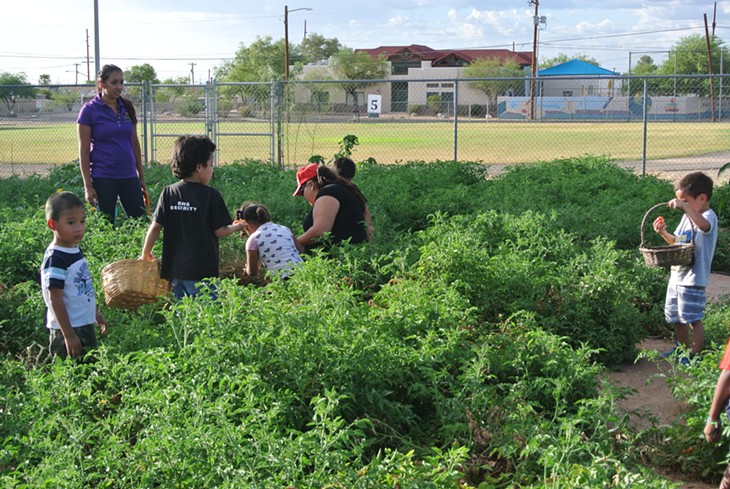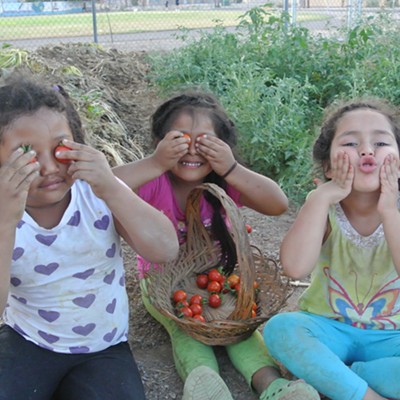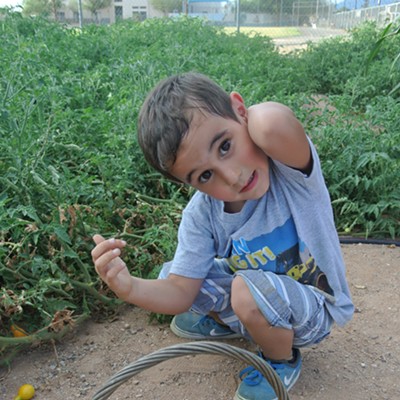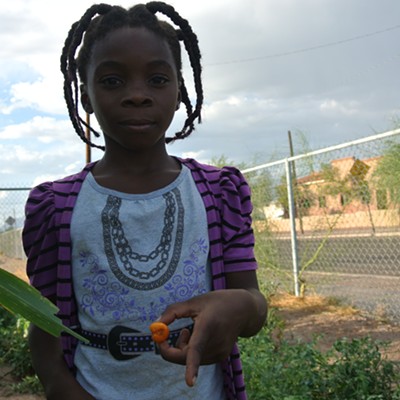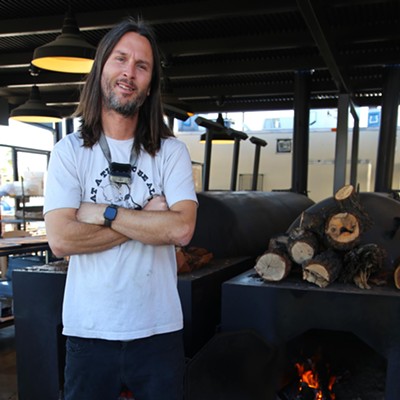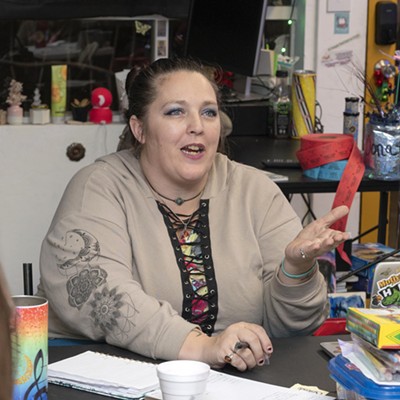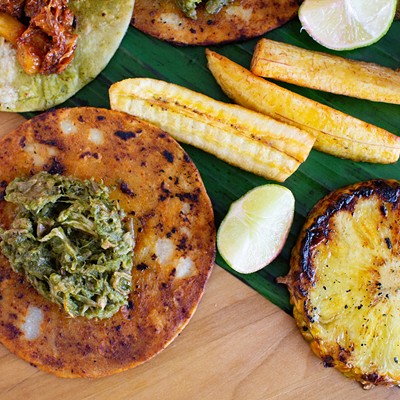It didn’t matter that the sun beat down or that the farmers had worked hours already. Children’s giggles rang out like a chorus in a patch of green right off a busy parking lot—farmers with small hands who carried big baskets filled with red and yellow tomatoes.
Six-year-old Neveah Romero bent down to produce a tomato they wouldn’t be able to sell.
“Don’t pick the tomatoes that are red that have white because they are sunburned,” she said. “They get sunburned if they’re in the sun. They get a lot, lot burnt.”
Determining the ripeness of a vegetable isn’t the only skill that the children participating in the Best Day Ever Kids Garden Project are learning. Here, kids from preschool to high school are learning about hard work, nutrition, seeing a project from start to finish, economics and social skills.
The project started early this year by Taylor Moore, a veteran of community enrichment through gardening. Having piloted similar programs in El Paso with upwards of 40 to 60 children, he knew he wanted to create a garden here and encourage children to make every day the best day.
Moore said Tucson’s south side was the perfect space for what he calls “the laboratory of our future,” something he sought in El Paso. The garden is located near a Food City on Seventh Avenue and 38th Street, a place surrounded by schools. Currently Hollinger K-8, Pueblo Magnet High School, Ochoa Elementary School and Tuty’s Child Care have plots at the garden.
Moore teaches them how to care for, harvest and weigh vegetables on their plots. Once the harvest is done, Moore makes his rounds to the local farmers markets to compare prices and determine what their vegetables will sell for.
“These little kids got to do all that,” Moore says. “If they keep their garden going good, once they harvest and go sell it, they make money.” Hollinger principal Brian Lambert said money is one of many things his students love about the experience.
“We are teaching different kids, groups and families to be self-sufficient,” he says. “One of the kiddos was just telling me he has two $20 bills this summer."
Hollinger has three plots in the kids garden with four to five classes working at different times. They have two gardens on their own site that Moore tends to daily.
“As a person who was never really big into fruits and veggies, how great is it that we actually have youth who are popping tomatoes,” says Lambert.
According to Jessica Contreras, a teacher at Tuty’s Child Care, learning where food comes from has opened her students to vegetables they once scoffed at.
“They would look at a tomato and be like, ‘No I don’t want to eat a tomato, it’s nasty,’ but now they have the opportunity to get out and know they are the ones who picked it,” she says.
Alongside Moore and his mini farmers, volunteers come from various nonprofits and schools.
Volunteer Leah Farbstein became involved through AmeriCorps and was already working with students at City High School on nutritional education.
“I was interested in helping them start eating the food, that was the appeal at first, being here to cook with students. Then it just evolved to me helping out whatever I can,” she says. “It gives them a chance to see where their food comes from, but also for them to see that having a business and selling something can be completely attached to having a great time.”
The project is based on participation. Those who do not participate in the farmers markets at least twice a month will lose their space. After a price per pound is determined, the groups pay a third of what they think their harvest will bring in and can trade or sell to each other. Tuty’s made over $100 for a harvest from their two plots in one evening.
“They will spend it on the kids,” says Moore. “We don’t ask for grants. Those kids generate the income. That third of money that goes to the garden—that income that the kids generate can pay for the project.” Participating groups pay a monthly $6 plot fee to the Community Gardens of Tucson, a nonprofit with 24 gardens throughout the city. They provide the use of their technician for maintenance, tool upkeep and volunteer aid.
Currently, local businesses like Urban Fresh and 5 Points Market buy and trade produce with Moore, and the children to use in their menus. Both use composting bins to turn their compostable kitchen waste into quality soil for the garden.
Food is not the only thing growing in abundance on the south side. Children are growing, a community is bearing fruit, economic empowerment is rooting early and a group of people, young and old, can just enjoy each other’s company in the shade.
So, what does it actually take to have the best day ever?
“You got to begin with a purpose,” said Moore. “At this point in my life, I am sure that unless your purpose is to repair the planet that my generation so successfully destroyed, you’re going to be in trouble. We will have a powerful group of kids right in the middle of south Tucson who have food security issues they can solve, and you can’t go wrong with that.”
For more information contact the Community Gardens of Tucson at 795-8823.

